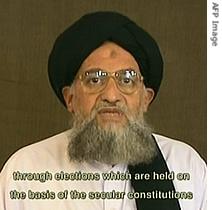2007年VOA标准英语-Al-Qaida Organization Remains Question Mark
搜索关注在线英语听力室公众号:tingroom,领取免费英语资料大礼包。
(单词翻译)
By Gary ThomasWashington
27 April 2007
Saudi Arabia announced Friday the roundup of 172 suspected terrorists for plots to attack Saudi installations. Those arrested are believed to be local members of al-Qaida. In this background report, VOA correspondent Gary Thomas tells us there are disagreements among Western intelligence analysts2 about the organization of today's al-Qaida on the global and local level.
The Taleban was ousted3 from power in Kabul and al-Qaida was forced underground by the U.S. invasion of Afghanistan in 2001. But the jihadists have proved to be resilient. The Taleban has regrouped to launch new attacks into Afghanistan from safe havens4 in Pakistan's border areas.
 |
| An image grab taken from a video broadcast on Al-Jazeera television 20 Dec 2006 shows al-Qaida number two Ayman al-Zawahiri |
Bruce Riedel, who has served in senior positions in the Pentagon, the CIA., and the National Security Council, says al-Qaida was, as he put it, on the ropes in 2002, but the U.S. failed to deliver the knockout punch.
"We've seen al-Qaida and its Taleban allies rebuild their base of operations in Pakistan and Afghanistan [in] what I call the 'Pakistani Badlands.' These operations were interrupted by the invasion of Afghanistan," he said. "But instead of finishing the job, we turned our attention away from it to Iraq. And they have successfully recovered."
But there are differences of opinion in counter-terrorism and intelligence circles about the how al-Qaida has reconstituted itself.
One U.S. counter-terrorism analyst1, who cannot be publicly named for security reasons, says al-Qaida is seeking to unite disparate radical5 Islamic jihadist groups under the al-Qaida banner.
This analyst, whom we will call "Nancy," says that al-Qaida has signed up some significant jihadist groups. But, she adds, some radical Islamist organizations are reluctant to get absorbed into al-Qaida for fear their local grievances6 or concerns will be overshadowed by al-Qaida's wider global objectives.
"Al-Qaida itself has attempted, I think, to become a bit more in control, if they can, more centralized," she said. "They still believe very firmly in having an organized jihadist movement, and they have achieved that to a certain degree.
"But there are individual disagreements, there are groups that want to maintain their own identity. And so it isn't always perfect from al-Qaida's point of view," she added.
But Bruce Riedel, who has 30 years of intelligence experience in the Middle East, believes that al-Qaida is more loosely organized. Using a business model, he says the organization is satisfied with franchises8 instead of strong centralized control.
"Al-Qaida doesn't seek to be the Comintern of the Islamic revolution. It is quite happy to franchise7 out and allow local groups a fair degree of independence as long as they adhere to the overall ideology9 of jihadism, and striking both the far enemy and the near enemy," he said. "And one of the most disturbing things I think we're seeing recently is the increasing proliferation of these franchises."
Intelligence analyst Nancy says that if al-Qaida is going down the franchise path as Riedel asserts, it may do so to ensure that the global jihad continues even if the central al-Qaida command is eliminated.
"If al-Qaida succeeds in the franchise thing, and they really have groups that will follow al-Qaida's agenda, if they really get them signed on and they create a situation where they don't need the leadership and we find a situation where it really doesn't matter if we find bin10 Laden11 and al-Zawahiri, that now it's self-perpetuating -- that's what I'd be most concerned about," she said.
Riedel says al-Qaida in Iraq under the leadership of Abu Musab al-Zarqawi has been the most successful al-Qaida franchise as he exploited the differences between Sunni and Shi'ite Muslims.
"The al-Qaida franchise in Iraq in particular has a intense anti-Shia animus," said Riedel. "Abu Musab al-Zarqawi, whatever we may say of him, was an evil genius in that he understood that the way to create chaos12 in Iraq was to strike at the fault line of Iraqi politics, the Sunni-Shia divide, and create a Sunni-Shia civil war. He succeeded, perhaps, even beyond his own imagination."
Zarqawi merged13 his insurgent14 group with al-Qaida in 2004 and swore allegiance to Osama bin Laden. But differences later emerged, analysts say, between Zarqawi and al-Qaida leaders, who found Zarqawi's tactics counterproductive and too brutal15 even for them. Zarqawi was killed by a U.S. air strike in June of last year.
 收听单词发音
收听单词发音 




